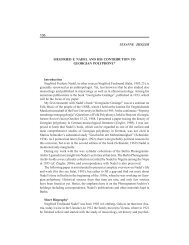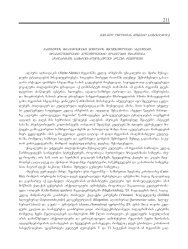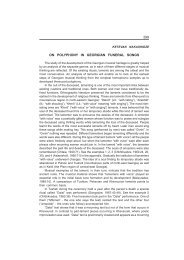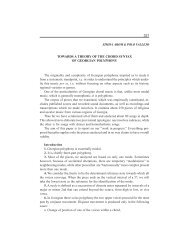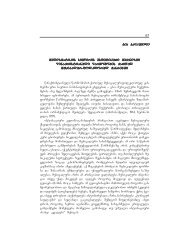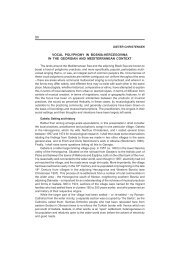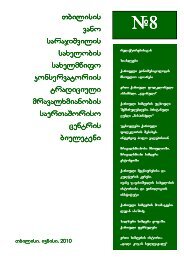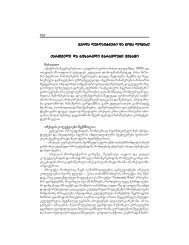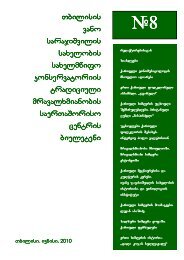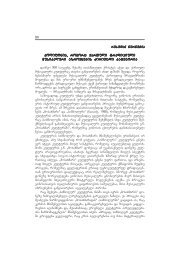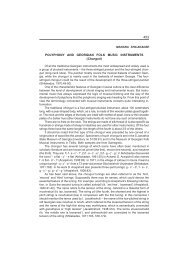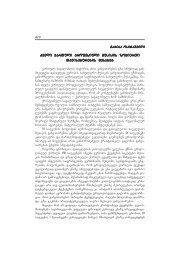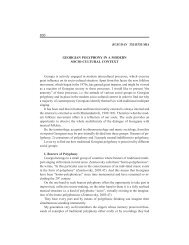- Page 3 and 4:
ContentsForeword and acknowledgemen
- Page 5:
South Asia: India (Assam; Southern
- Page 9:
more enjoying the traditional ‘Ho
- Page 12 and 13:
12the rest of the country does not
- Page 14 and 15:
141989:Let me briefly introduce som
- Page 16 and 17:
‣ During the last 20 years of my
- Page 18 and 19:
18Saharan African populations, than
- Page 20 and 21:
and of course, Sheree Reece from th
- Page 22 and 23:
22Part 1.World stylesof traditional
- Page 24 and 25:
used term, although not universally
- Page 26 and 27:
30 January, 1986). Hugh Shields gav
- Page 28 and 29:
western Georgian polyphonic “trio
- Page 30 and 31:
30contains more than one compositio
- Page 32 and 33:
32rhythmic component in African mus
- Page 34 and 35:
Gerhard Kubik, if you want to count
- Page 36 and 37:
36missionaries was very much aided
- Page 38 and 39:
as witness recordings by barely a d
- Page 40 and 41:
40England provides an incredibly in
- Page 42 and 43:
of West Africa is a well-known and
- Page 44 and 45:
44African populations played a cruc
- Page 46 and 47:
46unusual element of Tuareg culture
- Page 48 and 49:
48heterophony). European profession
- Page 50 and 51:
50famously declared that to verify
- Page 52 and 53:
Out of these five main types of Rus
- Page 54 and 55:
54heterophonic and octave forms of
- Page 56 and 57:
56Ex. 3. Abkhazia. (Akhobadze, Kort
- Page 58 and 59:
58Balkarians and KarachaevisThese t
- Page 60 and 61:
60Ossetian polyphony is based on th
- Page 62 and 63:
62Garakanidze, who conducted a shor
- Page 64 and 65:
64in the southern part of the settl
- Page 66 and 67:
66Almeeva noted the presence of the
- Page 68 and 69:
68UkraineRegarding polyphonic singi
- Page 70 and 71:
70200), the difference between dron
- Page 72 and 73:
72BelarusBelarus is a part of the
- Page 74 and 75:
74Besides the drone and heterophoni
- Page 76 and 77:
76of the feast traditions and long
- Page 78 and 79:
78East GeorgiaEast Georgia consists
- Page 80 and 81:
80Fig. 3. Modulation from G to G# t
- Page 82 and 83:
82Polyphonic singing traditions in
- Page 84 and 85:
84In this four-part section we can
- Page 86 and 87:
86Improvisation in western Georgian
- Page 88 and 89:
88During our 1999 fieldwork in Geor
- Page 90 and 91:
90Interestingly, as Anzor Erkomaish
- Page 92 and 93:
92Different western Georgian dialec
- Page 95 and 96:
95Ex. 37. Lile. Ritual song dedicat
- Page 97 and 98:
97David Shugliashvili, both eastern
- Page 99 and 100:
99Urban MusicThe urban singing styl
- Page 101 and 102:
101Ex. 42. Suliko. Urban love song.
- Page 103 and 104:
103In Georgian traditional polyphon
- Page 105 and 106:
105BalkansThe Balkans are one of th
- Page 107 and 108:
107the tradition of polyphonic sing
- Page 109 and 110:
109It represents an interesting mix
- Page 111 and 112:
111Ex. 54. Bosnia and Herzegovina,
- Page 113 and 114:
113MacedoniaSpeaking about Macedoni
- Page 115 and 116:
115Ex. 59. Albania. Laberi style po
- Page 117 and 118:
117of fact, together with Romania,
- Page 119 and 120:
119countries of the Baltic region a
- Page 121 and 122:
121research about sutartines (Slavi
- Page 123 and 124:
123LatviaAnother Baltic country, La
- Page 125 and 126:
125Ex. 68. Estonia. Setu polyphony
- Page 127 and 128:
127Tbilisi State Conservatory in th
- Page 129 and 130:
129contracted this peculiarity of s
- Page 131 and 132:
131throughout medieval northern Eur
- Page 133 and 134:
133electronic media; and whether th
- Page 135 and 136:
135To complete the review of the Ce
- Page 137 and 138:
137(9) The singing style is harsh a
- Page 139 and 140:
139ItalyWith its internationally re
- Page 141 and 142:
141than 120 Sicilianvillages and it
- Page 143 and 144:
143Vocal Polyphony in AsiaAsia is b
- Page 145 and 146:
145music of Ancient Greece itself i
- Page 147 and 148:
147possible space of a second.” T
- Page 149 and 150:
149sources from the 5 th (Favstos B
- Page 151 and 152: 151polyphonic singing came from Taj
- Page 153 and 154: 153(asamchilog, choir). 6/8 metre i
- Page 155 and 156: 155or less in unison, and one voice
- Page 157 and 158: 157Lithuanian sutartines, where you
- Page 159 and 160: 159idea of how rich (and how unknow
- Page 161 and 162: 161Ex. 90. China, Tibet (Bucher, 19
- Page 163 and 164: 163South-East AsiaVietnamAccording
- Page 165 and 166: 165Not all the traditions and music
- Page 167 and 168: Vocal Polyphony in North AmericaThe
- Page 169 and 170: 169west of the region (Densmore, 19
- Page 171 and 172: 171the Indian melodies continue wit
- Page 173 and 174: 173(Burney 1975:84. Cited from Kaep
- Page 175 and 176: 175Easter Island] and the westernmo
- Page 177 and 178: 177of Northwest American Indians an
- Page 179 and 180: 179Of course, to say that the pre-W
- Page 181 and 182: 181faraway cultures without contact
- Page 183 and 184: 183• Anne Draffkorn Kilmer sugges
- Page 185 and 186: 185some extinct civilizations (anci
- Page 187 and 188: 187hear assertions that a certain s
- Page 189 and 190: 189population of North Greece, moun
- Page 191 and 192: 191and possibly about the cultural
- Page 193 and 194: 193rules of Polynesian traditional
- Page 195 and 196: 1953. Social organization of the si
- Page 197 and 198: 197(2) Another inconvenience is tha
- Page 199 and 200: 199According to the common belief o
- Page 201: 201level. Darwin made a correct con
- Page 205 and 206: 205Even in cases of century- and mi
- Page 207 and 208: 207With the convincing and well-doc
- Page 209 and 210: 209Conclusions for the previous two
- Page 211 and 212: 211Indo-European family of language
- Page 213 and 214: 213all musicians are Bachs, but all
- Page 215 and 216: 215Switzerland, Germany, Austria, I
- Page 217 and 218: 217evidence for them. If a proto-Ca
- Page 219 and 220: 219West and Central Asia. Solo perf
- Page 221 and 222: 221monophonic singing styles. So, w
- Page 223 and 224: 223(1) Drone dissonant-based polyph
- Page 225 and 226: 225the ancient drone polyphony with
- Page 227 and 228: 227major forests, islands, continen
- Page 229 and 230: 229the influence of the “oriental
- Page 231 and 232: 231• Florian Messner (1980) point
- Page 233 and 234: 233(“collective”) sutartines wi
- Page 235 and 236: 235Case Study #7Overtone Singing of
- Page 237 and 238: 237together wit Valentina Suzukei (
- Page 239 and 240: 239(8) As harmonics are a universal
- Page 241 and 242: 241(as “collective sutartines”)
- Page 243 and 244: 243perspective, can provide more us
- Page 245 and 246: 245For a further discussion of this
- Page 247 and 248: 247with two other parts, sung by so
- Page 249 and 250: 249that there is hardly a single do
- Page 251 and 252: 251hairiness, Cavalli-Sforza sites
- Page 253 and 254:
253Two possible historical models m
- Page 255 and 256:
255where the former pearl diving bo
- Page 257 and 258:
257new territories (subject to the
- Page 259 and 260:
259minimum? And did the development
- Page 261 and 262:
261settlement history, and the most
- Page 263 and 264:
263instruments from Mediterranean r
- Page 265 and 266:
265music transcription. There are 5
- Page 267 and 268:
267• Even the transcription of Ku
- Page 269 and 270:
269“Music iconography can reveal
- Page 271 and 272:
271specific double flute made from
- Page 273 and 274:
273Case Study #14Polynesian Polypho
- Page 275 and 276:
275complexity plus precise enunciat
- Page 277 and 278:
277Case Study #15The Beatles: Ancie
- Page 279 and 280:
279Acknowledging the crucial differ
- Page 281 and 282:
281• Performance style. Arguably
- Page 283 and 284:
283C-major key, G major chord could
- Page 285 and 286:
285Ending of the songs on non-tonic
- Page 287 and 288:
287Fig. 16. Medieval West Georgian
- Page 289 and 290:
289phenomenon in the history of the
- Page 291 and 292:
291North America (according to the
- Page 293 and 294:
293Part 3Singing, Questioning, Thin
- Page 295 and 296:
295European and Middle Eastern mono
- Page 297 and 298:
297This characteristic raises one s
- Page 299 and 300:
299is not only a linguistic problem
- Page 301 and 302:
301with all their communicative ski
- Page 303 and 304:
303cooperative (and not competitive
- Page 305 and 306:
305group and groom each other, they
- Page 307 and 308:
307hungry lion. And here comes anot
- Page 309 and 310:
309“attacking power” of the “
- Page 311 and 312:
311Singing in Peaceful Times:Toward
- Page 313 and 314:
313he changed his view and linked t
- Page 315 and 316:
315Gestural Theory of Language Orig
- Page 317 and 318:
317among hominids. The situation of
- Page 319 and 320:
319whistle with a whistle. The inte
- Page 321 and 322:
321referential function. In contemp
- Page 323 and 324:
323mental abilities, but even music
- Page 325 and 326:
325articulated elements, where the
- Page 327 and 328:
327development experts would unanim
- Page 329 and 330:
329years after 1996, if I see a new
- Page 331 and 332:
331• Why do we ask questions?This
- Page 333 and 334:
333With the emergence of the abilit
- Page 335 and 336:
335apes’ and humans’ mental abi
- Page 337 and 338:
337The fascinating fact about the T
- Page 339 and 340:
339curiosity cannot exist, although
- Page 341 and 342:
341• Question intonation is argua
- Page 343 and 344:
343A few cases of “wolf children
- Page 345 and 346:
345(2) Children under two and pidgi
- Page 347 and 348:
347Let’s Talk: Origin of SpeechTh
- Page 349 and 350:
349article concluded with the sugge
- Page 351 and 352:
351are disposed to accept such a vi
- Page 353 and 354:
353articulated speech among the anc
- Page 355 and 356:
355speech (possibly in conjunction
- Page 357 and 358:
357function, while in the sub-Sahar
- Page 359 and 360:
359acquired, it is one of the most
- Page 361 and 362:
361millennia. So the historical dyn
- Page 363 and 364:
363of stuttering was mostly margina
- Page 365 and 366:
365when I reminded her of our conve
- Page 367 and 368:
367• A comparison of the stutteri
- Page 369 and 370:
369predisposition towards stutterin
- Page 371 and 372:
371There are some well-researched p
- Page 373 and 374:
373Developmental dyslexiaStuttering
- Page 375 and 376:
375mastery or correct usage of soun
- Page 377 and 378:
377• As the process of the declin
- Page 379 and 380:
379major African ground predators (
- Page 381 and 382:
381PostScript:Moral and ethics issu
- Page 383 and 384:
383(Jordania, 1989:240), believing
- Page 385 and 386:
385without turning these difference
- Page 387 and 388:
387Central African Republic, Bangul
- Page 389 and 390:
389polyphon y.” 4. Nailia Almeeva
- Page 391 and 392:
391aural tradition: Results and the
- Page 393 and 394:
3931. Tamar Chkheidze. “Peculiari
- Page 395 and 396:
395Krimanchuli (Yodel) in West Geor
- Page 397 and 398:
397ReferencesABDUSHELISHVILI, MALKH
- Page 399 and 400:
399ASAFIEV, BORIS. 1971. Musical fo
- Page 401 and 402:
401BLACKING, JOHN. 1973. How musica
- Page 403 and 404:
403BUCHER, KARL. 1923 (1919). Arbei
- Page 405 and 406:
405COOKE, PETER. 1998. East Africa:
- Page 407 and 408:
407ELSCHEKOVA, ALICA. 1963. “Der
- Page 409 and 410:
409GANDOUR, JACK, SORANEE H. PETTY,
- Page 411 and 412:
411HALPERN, IDA. 1975. “Music of
- Page 413 and 414:
413JELINEK, JAN. 1978. Homo erectus
- Page 415 and 416:
415methodologies? Erich Stockmann z
- Page 417 and 418:
417---- 1975. Music of Ainu. In Pro
- Page 419 and 420:
419KUTER, LOIS. Brittany. In The Ga
- Page 421 and 422:
421MACCHIARELLA, IGNAZIO. 2005. The
- Page 423 and 424:
423Symposiu m on Traditional Polyph
- Page 425 and 426:
425PERETZ, ISABELLE. 2003. Brain sp
- Page 427 and 428:
427---- 2003. The geographical dist
- Page 429 and 430:
429SALEH, MAGDA. 2002. Dance in Egy
- Page 431 and 432:
431SNOWDON, CHARLES T. 1982. “Lin
- Page 433 and 434:
433THORNE, ALAN G., and MILFORD H.
- Page 435 and 436:
435WEIDENREICH, FRANZ. 1943. The "N
- Page 437 and 438:
437Materials of the Voronezh confer
- Page 439 and 440:
439Aotearoa (New Zealand) 174Apan,
- Page 441 and 442:
441Brambats, Karl 183, 231Brandel,
- Page 443 and 444:
443Dancing 10, 31-32, 36, 38, 40-43
- Page 445 and 446:
445Gamkrelidze, Thomas 18, 216, 253
- Page 447 and 448:
447Iso 114, 116 (see also drone)Ist
- Page 449 and 450:
449McFarlane, Iain 19McNeill, Willi
- Page 451 and 452:
451Niger 45Nikoladze, Ketevan 18, 2
- Page 453 and 454:
453Qollas 171questions, asking ques
- Page 455 and 456:
Sotho 40Sorce-Keller, Marcello 139-
- Page 457 and 458:
457Tsurtsumia, Rusudan 18, 392-4, 3
- Page 459 and 460:
Zhoukoudian 353Zhvania, Tina 18, 39



